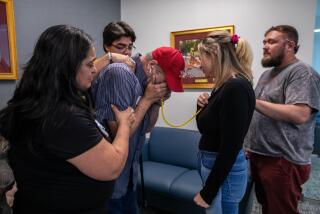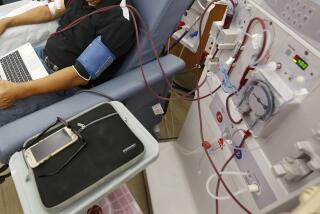Selling Organs for Transplant
- Share via
Having recently had a liver transplant, I would like to comment on Ed Carson’s column, “One Liver to Highest Bidder” (Commentary, July 17). One of the reasons that hospitals and physicians set extremely stringent standards for transplant is that the surgery is highly complex. I am 43 and waited 15 months for a liver after being accepted as a transplant candidate. To become a candidate, I went through one week of extensive medical testing. Patients who have impaired respiratory or circulatory systems have a more difficult time in recovery and may not be considered good risks.
Every time the state or federal government passes a health or safety regulation, the pool of potential donors decreases. Two examples are the motorcycle helmet law and the bicycle helmet law. Fewer injuries/deaths translate to fewer available donor organs.
Selling a kidney to rise out of poverty? I think not. If one sold a kidney for $100,000, he/she might rise out of poverty for three or four years. Then what?
JEFFREY S. BECKWITH
Irvine
* As I write this letter my wife is in the UCLA liver transplant intensive care unit waiting for a liver to become available. The hospital bill is estimated to be $176,000; the surgeon’s bill will be over $20,000, and add to that the cardiologist, nephrologist, pulmonologist, hepatologist, hematologist and infectious disease consultants, and $15,000 per year for immunosuppressive drugs for the rest of her life, if she survives the surgery. I heartily agree with Carson that the donor or his/her estate should also be reimbursed; hopefully, that will encourage more organ availability.
JAY R. HODES MD
Sherman Oaks
* I sympathize with the view of Carson. There aren’t enough donors for all the persons waiting. I have long carried the donor card with my driver’s license. But we can work around the money problem without capitulating to basic human greed by buying the organs. My idea is to form a donors society.
If you sign up as a potential donor while you are healthy, you would be first in line for the donated organs of another society member if you needed them in the future. That way, your offer is in effect buying a type of insurance. I realize younger persons rarely think of the future. Since the young and healthy are initially needed, a young person could sign on with the society to provide eligibility for an older relative.
It would be like donating their own organs to save a loved one. This way, we could tap into the basic need to be compensated without buying organs.
BILL DeBUSSEY
San Diego
* Carson states in his article that thousands of people die a needless death because it is against the law to buy organs from living people. I agree with him that people die because of this law, but they do not die a needless death. These people died so that our society can still believe that every person has the same right to a sound mind and body no matter whether they are rich or poor, black or white.
P.S. To whom it may concern: “We are sorry to inform you that your daughter suffered major injuries in a car accident yesterday. Since you have no medical insurance, the cost of the operations to heal your daughter will be $100,000. We know that you are poor and unable to pay this money, so we thought we might mention that the going price for a healthy kidney is $100,000. We are sure that you will make a rational decision. We look forward to hearing from you so that we can begin the operations on your daughter.”
DANE J. MOORE
North Hills






